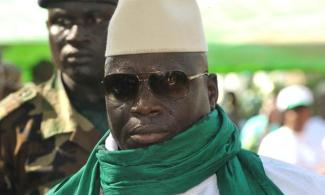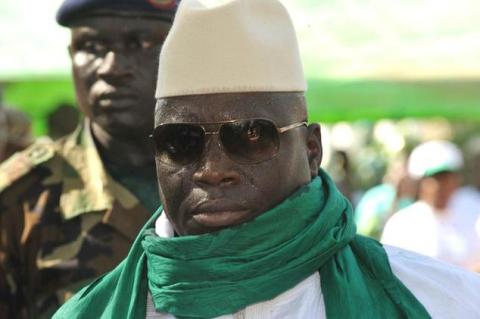
In its report titled Dangerous to Dissent: Human Rights Under Threat in Gambia, Amnesty International highlights the repressive tactics employed by the Gambian government to suppress all forms of opposition to President Yahya Jammeh’s rule.
Amnesty International has called on the Gambian government to free dozens of political prisoners and end its human rights abuses that have occurred in the run-up to this year’s elections. The group advocates that the Economic Community of West African States (ECOWAS) suspend The Gambia from its organization should the government continue its brutal repression of human rights.
In its report titled Dangerous to Dissent: Human Rights Under Threat in Gambia, Amnesty International highlights the repressive tactics employed by the Gambian government to suppress all forms of opposition to President Yahya Jammeh’s rule.
The report, published a day before the ECOWAS Authority of Heads of State and Government meet in Dakar, reveals that ‘dozens’ of peaceful protesters and bystanders were beaten by police during peaceful demonstrations in April and May 2016. Fifty-one people were arrested, including the leader of the opposition United Democratic Party (UDP), Ousainou Darboe, along with other party members. At least 36 people remain detained without charge.

One current detainee, Nogoi Nije, was arrested on April 14 and stated in an affidavit at the High Court how she was tortured by the National Intelligence Agency (NIA). Ms. Nije said she was beaten with hose pipes and batons by men masked with black hoods while water was poured over her.
Solo Sandeng, the UDP National Organizing Secretary, died in NIA custody. The United Nations, ECOWAS, African Commission on Human and Peoples’ Rights, European Union, and United States have called on the Gambian government to conduct an impartial, independent and transparent investigation into Mr. Sandeng’s death, but thus far, no investigation has commenced.
In response to these appeals, the Gambian president said, “People die in custody or during interrogations, it’s really common. This time, there is only one dead and they want investigations? No one can tell me what to do in my country.”
But Mr. Sandeng was not the only opponent of Mr. Jammeh’s rule who has died in detention. In February 2016, union leader Sheriff Dibba died in custody, and in October 2015, Iman Sawaneh ‘disappeared’ after submitting a petition to the president.
“Gambia has a long and brutal history of repression of critical voices, and demonstrators such as Solo Sandeng have paid a high price for peaceful protest,” said Alioune Tine, Amnesty International Regional Director for West and Central Africa.
The Jammeh government frequently uses the Public Order Act to prohibit demonstrations and opposition party gatherings. But since the presidential elections in 2011, new laws have been instituted that further restrict political rights. Three media outlets have been closed since then and dozens of journalists have fled the country due to persecution.
According to the report, Gambian authorities practice surveillance that instills fear and intimidation in the populace.
“You don't feel safe anywhere, even in your home. You don’t trust even your maids or drivers. You can pay someone $10 and they will give information. In public spaces you don’t speak about sensitive things,” an activist told Amnesty International.
“You don't know who is going to report you. You don't know who is behind you. You don't know who is paid by the NIA to be an informant,” a journalist in exile said.
Amnesty International concluded its report by calling on the international community, specifically, ECOWAS, to “consider stronger measures if Gambia does not make significant progress towards meeting its human rights obligations under international law.”
The group suggests that ECOWAS consider suspending The Gambia from its organization “if no progress on human rights is made” and if it continues to violate the ECOWAS Protocol on Democracy and Good Governance, “which demands full respect for the right to freedom of expression.” Amnesty International added that The Gambia has failed to implement three legally-binding judgments made by the ECOWAS Community Court of Justice over the torture of journalist Musa Saidykhan, the disappearance of journalist Ebrima Manneh, and the murder of journalist Deyda Heydara.
“If ECOWAS is serious about being a community of states that respect and promote the human rights of their people, it can no longer remain silent as one of its members so flagrantly disregards its treaty obligations,” Alioune Tine said.
The Gambia will hold elections in December 2016, when Mr. Jammeh will seek a fifth term in office. The Gambian leader has been the head of state since taking power in a military coup in 1994.